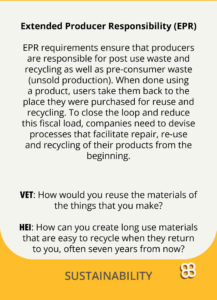Extended Producers Responsibility (EPR)
Extended Producer Responsibility (EPR) is a policy approach that shifts the responsibility for managing the post-consumer phase of a product’s life from governments to the producers. In the fashion industry, this means that brands and manufacturers are accountable not just for the creation and sale of their products, but also for what happens to these products after they are no longer useful to consumers. EPR policies are designed to ensure that producers take responsibility for the entire lifecycle of their products, including take-back programs, recycling, and waste management.
EPR encourages companies to design products with their end-of-life in mind, leading to innovations in repair, reuse, and recycling. By integrating these considerations into the design process, companies can reduce the environmental impact of their products and make it easier for consumers to return items for recycling or repurposing. This approach not only reduces waste but also helps to close the loop in product lifecycles, promoting a more circular economy.
One of the critical aspects of EPR is the take-back system, where consumers can return products to the point of purchase or designated collection points once they are no longer needed. The collected products are then either repaired for reuse, dismantled for parts, or recycled into new materials. This process helps to minimize the amount of waste that ends up in landfills and reduces the demand for virgin materials, thereby conserving natural resources.
For companies, EPR represents both a challenge and an opportunity. While it may impose additional costs and logistical demands, it also drives innovation and can lead to stronger customer loyalty by demonstrating a commitment to sustainability. Companies that successfully implement EPR can differentiate themselves in the market by offering products that are not only high-quality and durable but also designed for easy recycling and minimal environmental impact.
Case studies
Filippa K
Filippa K, a Swedish fashion brand, is recognized for its strong commitment to sustainability and circular fashion principles. The brand has implemented an Extended Producer Responsibility (EPR) strategy by offering a leasing service for its garments, allowing customers to rent clothing items instead of purchasing them. This initiative not only extends the lifecycle of garments but also reduces waste and encourages customers to return items after use, which are then refurbished, resold, or recycled. Read more about Filippa K
Woolmark
Woolmark, a global authority on wool, collaborates with fashion brands to promote the recycling and upcycling of wool garments. Through the Woolmark Recycling Initiative, the organization partners with brands to implement take-back programs, where customers can return used wool items. These items are then recycled into new wool products, ensuring that wool fibers are continuously reused, thus minimizing waste. Read more about Woolmark
The North Face
The North Face has developed the Clothes the Loop program, where customers can bring used clothing and footwear (from any brand) to The North Face stores for recycling. The collected items are either reused, recycled, or repurposed into new products. This initiative is part of The North Face’s commitment to reducing landfill waste and promoting sustainable practices in the outdoor apparel industry. Read more about The North Face’s Clothes the Loop
Nike
Nike’s Reuse-A-Shoe program is an example of EPR in action. Customers can return worn-out athletic shoes to Nike stores, where the shoes are then processed and turned into Nike Grind, a material used in creating new sports surfaces, playgrounds, and products. This program highlights Nike’s efforts to close the loop and reduce the environmental impact of its products. Read more about Nike’s Reuse-A-Shoe
Nudie Jeans
Nudie Jeans, a Swedish denim brand, has integrated EPR into its operations through its “Repair Shops” and “Reuse” initiatives. Customers are encouraged to return their old Nudie Jeans for repair, or they can buy second-hand pairs directly from the brand. The returned jeans are either repaired and resold, or the materials are recycled into new products. This approach extends the life of the jeans and reduces textile waste. Read more about Nudie Jeans’ sustainability
References
- Lewis, Helen, and J. Fitzpatrick. “Sustainable Packaging: A Study of Extended Producer Responsibility in the Fashion Industry.” Journal of Sustainable Fashion 12.3 (2020): 235-248.
- Watson, David, and Anders Damgaard. “Extended Producer Responsibility for Textiles: A Policy Review and Analysis.” Ecological Economics 169 (2020): 106567.
- Kirchherr, Julian, et al. “Extended Producer Responsibility Policies: An International Review.” Journal of Cleaner Production 248 (2020): 119233.
- Larsen, Niels Henrik, and Michael Karlsson. “Circular Economy and EPR: Reducing Waste in the Apparel Sector.” Environmental Research Letters 15.7 (2020): 074014.
- Andrews, D. “Closing the Loop: A Case Study on the Implementation of Extended Producer Responsibility in the Fashion Industry.” Resources, Conservation, and Recycling 165 (2021): 105277.
- Tojo, Naoko, and Tomohiro Sakanashi. “Extended Producer Responsibility in a Circular Economy: Potential for EPR in the Textile Sector.” Journal of Industrial Ecology 24.3 (2020): 426-436.
